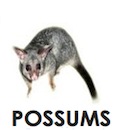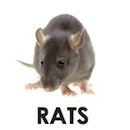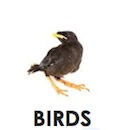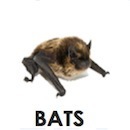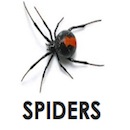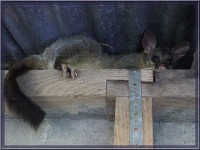RAT HABITS
Rats usually live in colonies within the walls and roof of a building, and unfortunately if you are hearing them in your roof then you already have a large number of them sharing your residence. It is only the non-native varieties such as the BLACK ROOF RAT & NORWAY RAT that have the ability to climb and gain access to your ceiling and/or wall cavities or the spaces between the floors in your building. In most buildings, they will choose a nesting site somewhere within these cavities usually near pipes, i.e. the bathroom, ensuite, kitchen or laundry. Depending on the density of the rat population, mating behaviour may vary. At low densities, one male rat mates with a burrow of females. He will defend the burrow from other males and will mate solely with the females within his group.

When rat populations are large, a social hierarchy develops within a burrow. Stronger males become dominant, while weaker males are subordinate. Males no longer protect female burrows. When a female is oestrous, several males mate with her sequentially, in the order of their social dominance. When the colony grows too large, and the dominant animals feel that it has become unsustainable (approximately every 4 – 6 weeks on average) they will force up to 30% of the younger population to move out and take up residence elsewhere. This results in a week or so of rustling, squeaking and scrambling noises as the colony goes in to, what in effect is a “CIVIL WAR”. These are the animals you will need to prevent starting a colony that come from your surrounds after you have eradicated your colony, a regular baiting regime can achieve this.
Rats exhibit aggressive behaviour when threatened. They may fight, chase, bite and box. Wild rats do not display some behaviour’s observed in domestic species, particularly sidling and belly-up defensive postures.
Rats dwell in cities, suburbs and rural areas (everywhere). They are largely dependent on a fresh water supply & human communities for basic survival. They are curious explorers and often explore new surroundings. Rats are known to travel great distances, usually through the underground storm water piping system, and are cautiously wary of unknown objects in their established foraging paths. This scepticism makes trapping and/or baiting a rat colony particularly difficult.
Due to the constant growth of rat incisors, they have a desiring need to gnaw; this helps them keep their teeth at a healthy length. This gnawing in a roof in your home is BAD NEWS as it generally involves the chewing on your electrical circuits and internal timber work. Over time this gnawing can prove extremely costly.
Obvious cabling damage from RAT “gnawing”.
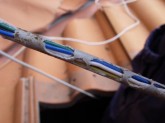 Rats can also carry disease, and have unsightly and potentially harmful toilet manners. I have personally been in many a roof space and have been faced with the putrid odours associated with a rat infestation. It is never a pleasant experience. It doesn’t matter how many holes you seal up, rats will either squeeze through some other opening or just as quickly, chew a new one for themselves. Poison is by far the best and in our opinion the only answer to a rat infestation.
Rats can also carry disease, and have unsightly and potentially harmful toilet manners. I have personally been in many a roof space and have been faced with the putrid odours associated with a rat infestation. It is never a pleasant experience. It doesn’t matter how many holes you seal up, rats will either squeeze through some other opening or just as quickly, chew a new one for themselves. Poison is by far the best and in our opinion the only answer to a rat infestation.
At POSSUMS PLUS we, at every inspection, check for possum entry/exits and rodent activity before giving you a full and extensive oral report on what is getting in, making noise and from where, before we do any work, and at the completion, feel confident enough in the results to give you a full 12 month guarantee….. even for rats! No other pest company is offering that, not that we know of anyway. That’s confidence for you hey….
RAT evidence amongst insulation in a roof space.
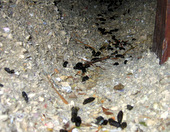
Whilst the average person can and will throw “rat sack” or another supermarket brand of poison in the roof to kill the rats, it’s not always the correct way to manage them. This will usually leave a few of the wiser rats to survive, and in just a few short months you will be back where you started…still with a rat colony. What’s more, they may be bait shy to the poison as a whole. In other words, THEY KNOW WHAT IT IS, and won’t touch it as a result.
We on the other hand understand the importance of eradicating the entire colony in one fast and direct swoop. We do this by using the highest quality Brodifacoum based baits. We use this in a quantity that you can be assured will wipe out every last rat. The poison works by halting the rats bloods ability to clot, and in doing so, causes the rat to bleed internally, which in turn produces a thirst that forces the animals to search out their usual water supply, then after consuming comparatively large amounts of water the rat will die shortly thereafter…. well away from your home. It is very rare for rats suffering from our treatment to die in the treated building.
WHAT WE CAN DO FOR YOU!
We initially wipe out the colony with our tried and tested baiting methods. We place enough bait, in an appropriate way, to rid you of all resident rodents & catch any new comer’s after this for a period of 6 months, at which time a re-treat is highly recommended, then annually after that to prevent future colonisation. Sometimes, on rare occasions, in highly rat populated areas, more recent re-treating may be required. We will endeavour to assess this for you at the initial inspection process.
Please call us if you need any advice at all.
So if you have rats, please allow us to get rid of them once and for all, and then you can SLEEP PEACEFULLY!!!


